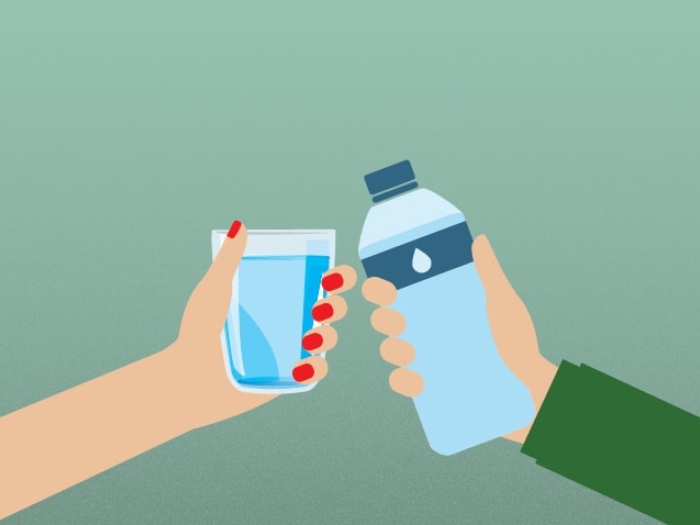A psychiatrist discusses the barriers to seeking help for alcohol use disorder and how to overcome them.
5:00 AM
Author |

'Dry January' isn't the only time to pay attention to your alcohol use. According to psychiatrist Gerald Scott Winder, M.D., when someone begins to feel like drinking alcohol brings them more grief than joy, it might be a good time to reassess.
"The phenomenon of 'Dry January' started in the United Kingdom about 10 years ago," said Winder, who is a clinical associate professor in the departments of psychiatry, surgery and neurology at Michigan Medicine. "It really offers participants an opportunity to abstain from alcohol for an entire month. This helps people save money and, pay attention to and improve upon their physical and mental states. But the beginning of the year shouldn't be the only time when we take care of ourselves."
Nearly 85% of adults in the United States will drink alcohol in their lifetimes, while 70% have drank alcohol within the last year and about 50% have consumed alcohol in the last month. With statistics like these, Winder notes how significant the COVID-19 pandemic has been on alcohol consumption rates.
MORE FROM MICHIGAN: Sign up for our weekly newsletter
"Massive societal changes and tragedies during the pandemic have correlated with a steep uptick in alcohol sales, drinking rates and alcohol-related conditions, like liver disease," said Winder. "As the pandemic drags on, I really hope that more of us will look closely at how we consume alcohol because the numbers aren't looking good."
But how do you know when your drinking habits put you at risk? Well, Winder says that while alcohol is "really, really sneaky," the psychological issues associated with alcohol use disorder can be more obvious than physical consequences from heavy and chronic use.
"Alcohol is tricky because it makes us feel pleasure, while many of the physical harms it incurs on our bodies go unnoticed until serious problems surface," said Winder. "Because we can't always detect these injuries until we've really hurt ourselves, it's sort of a double whammy of deception. But psychological alcohol-related problems can be more immediately obvious, and we should definitely pay attention to them."
Winder notes that individuals often have difficulty thinking objectively about their drinking habits and talking to others about them in a candid way. He says that this is an example of how alcohol problems in the brain manifest themselves.
"Alcohol use is just like eating or weight or other very personal health matters, which can make a lot of us shy when it comes to talking about it," he said. "It's easy to convince ourselves that something isn't a problem when it might be connected to culture, tradition and our longstanding beliefs about what is normal and acceptable. We pick up this sense from our family, friends and past experiences. Society and the media often play a factor in the development of these views, as well."
However, when individuals often get defensive about their drinking habits, regularly reject views from concerned loved ones or struggle to curtail alcohol use, Winder says something might be wrong.
"All of us need tools to get objective views on our health, like scales for weight or blood draws for lab values, but it's harder to get objective views of our thinking around sensitive topics like drinking," he said. "I often use the simple analogy with my patients that seeing a doctor or therapist is like looking in the mirror. We obviously need mirrors because we can't physically see ourselves without outside help, just as we have psychological blind spots about our drinking. Psychiatric specialists can help us glimpse our psychological 'reflections' if we are honest with them and ourselves."
Winder notes that the definition of one standard drink in the U.S. is 12 ounces of beer, five to six ounces of wine or 1.5 ounces of liquor. In addition, he says that some data show that as many as one in three U.S. adults misuse alcohol during their lifetime by exceeding low-risk guidelines.
"For men, this means more than 14 standard drinks per week or more than four drinks on any day," he said. "And for women (and all adults that are aged 65 and older), this means seven standard drinks per week or more than three drinks on any given day."
Winder adds that ongoing drinking problems are "quite common" and are referred to as "alcohol use disorders." The clinical diagnoses made in the U.S. for these conditions are based on 11-point criteria.
"We focus on various aspects related to risky drinking, as well as a physical dependence on alcohol, a loss of control when it comes to consuming alcohol, any social impairments related to one's alcohol use and an ongoing pattern of drinking despite the very real consequences of doing so," he said. "It's a very interconnected approach in making a diagnosis."
When it's time to find help
Winder says that sometimes individuals avoid seeking mental health treatment because of the stigma associated with therapy, as well as alcohol use disorders.
"In addition to facing the unfair judgements and prejudices of others, many people are fearful of facing the unknown because they've never seen a mental health professional," he said. "But viewpoints have evolved in recent years, which is promising. A general lack of confidence in psychiatric care seems a bit antiquated nowadays, which is a good thing."
He also adds that many people can make changes to their behaviors on their own, which can often be enough to eliminate mild alcohol problems.
"Just like how our general health might improve once we diet and exercise, whether or not we see a doctor about it, individuals can make small changes to their alcohol use which yield substantial results," said Winder. "When that's not the case, treatment for more severe alcohol use disorders includes a lot of psychological work that is made easier by professionals who help patients with lifestyle changes."
According to Winder, therapy and/or group meetings with sober peers and the use of medications to remain sober and deal with other co-occurring mental health problems are often the focus of alcohol use disorder treatment plans.
"Sometimes treatment is more than just a clinic visit once a week," he said. "A patient will sometimes need to go several times a week or every single day for a period of time. It all just depends on the severity of the case. Many people also find that staying connected to treatment down the line is beneficial in preventing alcohol use issues from returning."
Lastly, Winder notes that while there isn't a single path forward for everyone, help is out there for those that need it.
"If you're struggling, remember that an outside and objective view from a doctor or therapist might reveal a way to make some valuable changes," he said. "I'm a doctor who treats many people who suffer and die from alcohol-related problems. I can't hide that. But I also see many people who are very successful in treatment. And the hope that I have for my patients is still much stronger than the tragedies that I see. You're not alone in your situation and help is right around the corner."
To meet with a Michigan Medicine physician to get a referral to the Michigan Alcohol Improvement Network clinic, call 844-233-0433.
Like Podcasts? Add the Michigan Medicine News Break on iTunes, Google Podcasts or anywhere you listen to podcasts.

Explore a variety of healthcare news & stories by visiting the Health Lab home page for more articles.

Department of Communication at Michigan Medicine
Want top health & research news weekly? Sign up for Health Lab’s newsletters today!





